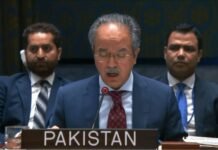Ethiopia, 28 July 2022 (TDI): The International Commission of Human Rights Experts on Ethiopia is visiting Ethiopia from 25-30 July.
Members of the @UN International Commission of Human Rights Experts on #Ethiopia are conducting their first visit to the country.
The Commission was established by the UN #HumanRights Council on 17 December 2021.
More on the mandate of the Commission ➡️https://t.co/E3LBIl1ieB pic.twitter.com/FRT19ZZkV0
— UN Human Rights Council (@UN_HRC) July 27, 2022
Commission of Human Rights Experts on Ethiopia
The UN Human Rights Council created the international commission of human rights on Ethiopia on 17 December 2021 in Entebbe, Uganda. The President of the Council, Federico Villegas appointed a Chair and two important experts. The commission also consists of three members. These include Kaari Betty Murungi from Kenya, Steven Ratner from the USA, and Radhika Coomaraswamy from Sri Lanka.

The Commission’s Mandate
The commission is valid for a period of one year. The commission’s mandate is to carry out a thorough and impartial examination into allegations and abuses of international human rights law and international refugee law in Ethiopia.
It should also be able to provide facts and circumstances regarding the alleged violations and abuses. The commission aims also to collect and store evidence and find the perpetrators.
Also read: UNHR’s High Commissioner concludes visit to Peru
The Council also mandates the Experts to show instructions on transitional justice including accountability, reconciliation, and healing. The human rights experts are also required to follow a gender perspective and a survivor-centered approach in their work.
The commission is to also involve all important stakeholders, including the governments of Ethiopia and Eritrea, regional state governments, and the office of the High Commissioner. Other stakeholders include the interministerial task force, the Ethiopian Human Rights Commission, African Union, the African Commission on Human and People’s Rights, the intergovernmental Authority on Development, and civil society.
At the fiftieth session 13 June-8 July, the Human Rights Council also expected the Human Rights Experts on Ethiopia to provide an oral briefing to the Council.
Following this, an interactive dialogue took place and the commission presented a written report to the Council.
Political scientist, poet and author








